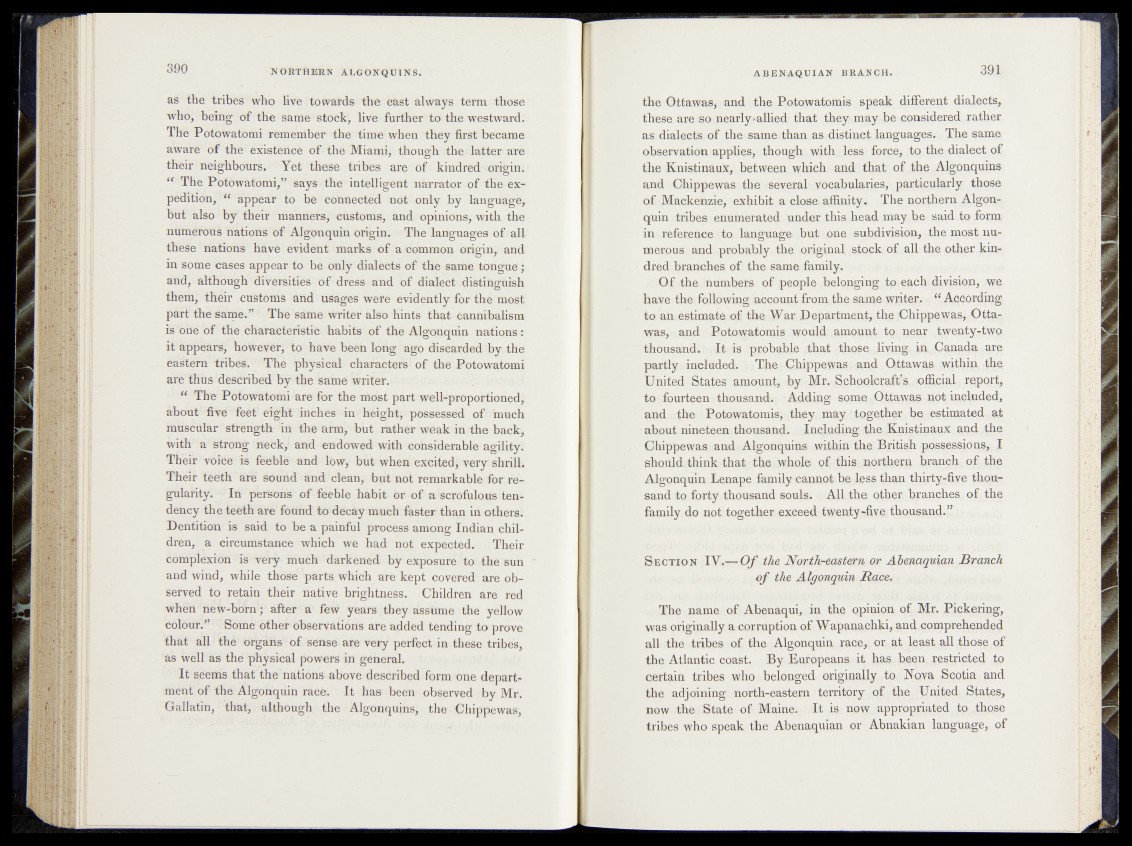
as the'tribes'' who li^ftóivajds^lïê east always term those
who, bmög^of the skmê tfetoek, live further to the westward.
The Potowatomi remember the time when they first became
aware of the* existence of the Miami, though the f latter are
their neighbours. Yet these tribes are of kindred origin.
“ The Potowatomi,” says the1 intelligent narrator of the expedition,'“
appear to be connected not only by language,
but'also by their manners, customs, and opinions, with the
numerous nations of Algonquin origin. The languages of all
these nations have evident marks of a common origin, and
in some cases appear to be only dialects of the same tongue j
and, although diversities of dress and of dialect distinguish
them, their customs and usages were evidently for the most
part the same.” The same writer also hints that cannibalism
is one of the characteristic habits of the Algonquin nations r
if appears, however, to have been long ago discarded by the
eastern tribes. The physical characters of (he Potowatomi
are thus described by the same writer.
"■ The Potowatomi are for the most part well-proportioned,
about five feet eight inches in height, possessed of much
muscular strength in the arm, but rather weak in the back,
with a Strong neck,* and endowed with eohsiderabfe'agfiity;
Their voice is feeble and low, but when excited* very shrill.
Their teeth are sound and clean, but not remarkable for regularity.
In persons of feeble habit or of a scrofulous tendency
the teeth are found to decay much faster than in others.
Dentition is said to be a painful process among Indian children,
a circumstance which we had not expected. Their
complexion is very much darkened by exposure to the sun
and wind, while those parts which are kept covered are observed
to retain their native brightness. Children are red
when new-born; after a few years they assume the yellow
colouri” Some other observations are added tending to prove
that all the organs of sense are very perfect in these tribes,
as well as the physical powers in general.
It seems that the nations above described form one department
of the Algonquin race. It has been observed by Mr.
Gallatin, that, although the Algonquims, the Chippewas,
the Ottawas* and the Potowatomis speak different dialects,
these vam so mearly-allied that they may be considered rather
as. dialects of the same than as :distinct languages. The same
observation applies, though with legs force, to the dialect of
the Knisfeaux, between and th a t'o f the f AJgonquins
and Chippewas the several' vocabularies, particularly those
of Mackenzie, exhibit a close affinity. The northern Algon?
quin tribes, enumerated under thisihead may he sjnjdtn\foriP?
in .referenee ito language but, ‘one subdivision j the most numerous
and probably the original, stock of all the other kindred
branches of the same family.
Of the numbers of people belonging to,each division, we
have the following account from the same writer. , “ According
to anestimate of the War Departm(en^ths iChipp§iiy|i,s, Qtta-
was, and Potowatomis would«; amount tq; pear twentyrtwq
thousand. It- is probable that those living in Canada are
partly included. The Chippewas and Qttawas within thq
United States amount, by Mr. Schoolcrattgijofl^ial - report,
toofaurteeni thousand* Adding sojmpHQttaw&£ jnpt included,
and the Potowatomis, they may together be estimated at
about nineteen thousand. Including the Kuisfinaqx and the
Chippewas and - Algonquins within the British possession^, I
should think that the. whole qfi,this; northern branch of the
Algonquin Lenape family cannot be less, than thirty-five thousand
to forty thousand souls. All the. other« branches of the
family do not together exceed twenty-five thousand.”
S ection IY.— O f the North-eastern or Abenaquian Branch
o f the Algonquin Race. |
The name of Abenaqui, in (he opinion. of Mr. Pickering,
was originally a corruption of Wapanachki, end comprehended
all the tribes of the Algonquin race, or. at least all those of
the Atlantic coast. By Europeans if has.- been, restricted to
certain tribes who belonged originally ; to iNjova Scotia and
the adjoining north-eastern territory of the United States,
now the State of Maine. It is now»appropriated to those
tribes who speak the Abenaquian or Abnakian language, of